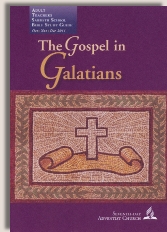|
||||||||||||||
Commentary on "The Priority of the Promise"
Day 7: Friday, November 4, 2011 - Further Study
Overview
As usual, Friday is dedicated to quotations from Ellen White. These lessons seem to demonstrate that Ellen White does, indeed, have the last word as far as Adventist theology is concerned, if I may be allowed a tongue-in-cheek remark! Somehow, nobody knows precisely how, Adventists' study of the Bible leads inevitably to Ellen White's conclusions. To be fair, the material from Ellen is not taken as the basis for studying the Bible; still, if indeed Adventists claim that Ellen White is not an infallible interpreter of the Bible, they should at least provide some examples of her biblical interpretations failing. One suggestion for helping the Adventists to find Ellen's faulty interpretations is to start with her comments on Galatians—or with her comments related to the reason for the giving of the law.
Observations
On a positive side, she recognizes that God first rescued the sons of Abraham from Egypt in order to stir gratitude in them for what He was and what He had done. Nevertheless, in her theology, something more than gratitude constitutes the motivation for being obedient to God. Indeed, the law has no power to save, but only to condemn; and indeed, people didn't realize that in themselves they had no power to be obedient to God's law. The law was given to bring awareness of this fact and to show their need of a Savior. Still, if the law's function was merely to reveal that man could not keep the law, it still would not condemn enough, because man, even endowed with power from God, could not be obedient to God's law, according to the law's standard. Gratitude toward God comes precisely from the fact that the believer should always be grateful for God's salvation because this salvation is never dependent on man's ability to be obedient to the law, even if he cooperates with God's enabling power.
We can never reach the law's standard, and because is never reached, God's grace is sufficient. God's grace is sufficient even if tomorrow our performance is still as bad as it was today, even if we repeat the same sins over and over and over again. In her theology, Ellen White was clear that in the end such a person, despite the grace she enjoyed, would be lost. Only the sins confessed and conquered will be erased from the heavenly record; only the victors, only those who left their sins totally behind will finally be safe, successfully passing the Investigative Judgment. From this Adventist perspective, the sinner, beside being grateful to God for the rescue mission accomplished in Christ, has another basic motivation in keeping the law: his ultimate destiny depends on it. He may enjoy today's salvation because today's sins are forgiven and carried by the High Priest in the Sanctuary, but his final salvation depends on his success in keeping the law—of course, with God's help. If he still fails again and again and again, at some point the moment of truth comes and, notwithstanding his continuous trust in Christ, he will be lost.
This is a sad picture, and there are Adventist theologians who are not willing to embrace the Adventist theology of the IJ in entirety. Still the mixture of elements from the Abrahamic covenant with those of the Mosaic covenant, of promise and law, of grace and works, creates a fog of confusion, because these things should be kept distinct in order to be rightly viewed. Law is not gospel, grace is not works; and while law and gospel are not opposites in themselves, in the Adventist theological paradigm they are both considered elements of salvation—and when they are equated this way, they are contradictory. Law cannot save, and gospel promise cannot condemn. There is no way of mixing the two in a theological melting pot without altering both of them. Combining elements of the Abrahamic covenant with elements from the Mosaic covenant is a deadly mixture. Paul does not mince words; the person who makes this cocktail cannot expect anything other than an anathema:
As we have said before, so now I say again: If anyone is preaching to you a gospel contrary to the one you received, let him be accursed (Galatians 1:9 ESV).
A person who mingles law and promise in a syncretistic theology that robs Jesus' work and righteousness of its power will receive the opposite of "Well done, good and faithful servant"
Copyright 2011 BibleStudiesForAdventists.com. All rights reserved. Revised November 3, 2011. This website is published by Life Assurance Ministries, Glendale, Arizona, USA, the publisher of Proclamation! Magazine. Contact email: BibleStudiesForAdventists@gmail.com.
The Sabbath School Bible Study Guide and the corresponding E.G. White Notes are published by Pacific Press Publishing Association, which is owned and operated by the Seventh-day Adventist church. The current quarter's editions are pictured above.
Official Adventist Resources
Standard Edition Study Guide Week 6
Teacher's Edition Study Guide Week 6
Easy Reading Edition Study Guide Wk 6
Search the Complete Published Ellen G. White Writings
Please Support This Project


